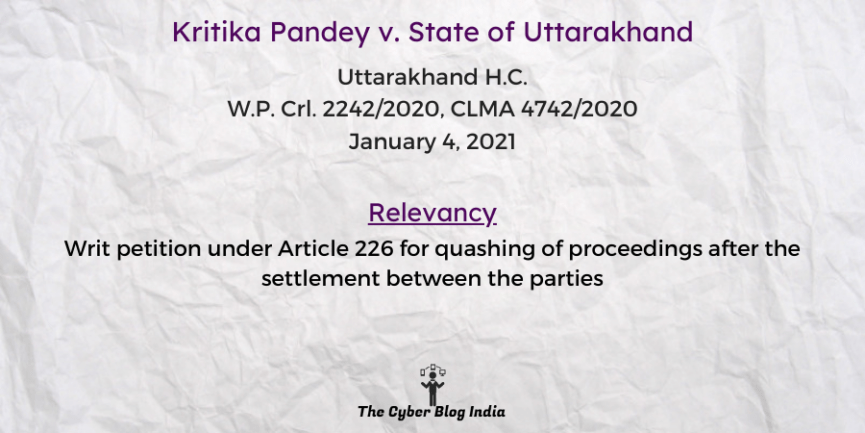Kritika Pandey v. State of Uttarakhand

Kritika Pandey v. State of Uttarakhand
In the High Court of Uttarakhand
W.P. Crl. 2242/2020, CLMA 4742/2020
Before Justice R.C. Khulbe
Decided on January 4, 2021
Relevancy of the case: Writ petition under Article 226 for quashing of proceedings after the settlement between the parties
Statutes and Provisions Involved
- The Constitution of India, 1950 (Article 226)
- The Information Technology Act, 2000 (Section 66D)
- The Indian Penal Code, 1860 (Section 354)
Relevant Facts of the Case
- The petitioners have filed this petition, in this case, to quash FIR number 0645 under Section 66D of the Information Technology Act, 2000 and under Section 354 of the Indian Penal Code, 1860.
- The parties had filed the compounding application to show that they had buried their differences and, subsequently, settled their disputes amicably.
Prominent Arguments by the Advocates
- The petitioner’s counsel, in the final analysis, cited Gian Singh v. State of Punjab (2013) 1 SCC (Cri) 160, a Supreme Court judgement highlighted that the High Court must consider whether it would be unfair or contrary to the interest of justice to continue with the criminal proceeding or the continuation would turn out to be an abuse of process of law despite settlement and compromise between the victim and wrongdoer.
- The petitioner’s counsel affirmed that while considering the question on the impact on proceeding with a case, the High Court has the right to quash such proceeding.
- The respondent’s counsel submitted that the High Court can quash FIR, and it is important to realise that Section 320 of the Code of Criminal Procedure, 1973 does not limit or affect the powers of quashing.
Opinion of the Bench
- The court was affirmative in view of the Gian Singh v. State of Punjab (2013) case highlighted by the petitioner’s counsel.
- The court also found that quashing of FIR is necessary to secure the ends of justice. However, such power is dependent on the facts and circumstances of each case.
Final Decision
- The court allowed the compounding application and quashed the pending proceedings between the parties.
